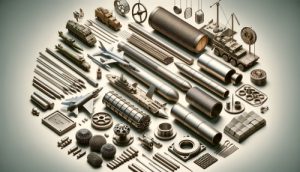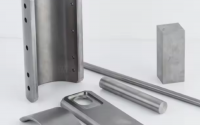All You Need to Know about Tungsten Heavy Alloys
Tungsten heavy alloys (WHAs) are a specialized group of materials predominantly composed of tungsten (typically 90-98%), combined with other metals like nickel, iron, or copper to enhance specific properties. These alloys are known for their high density, strength, and excellent performance in demanding applications. Here’s an overview of tungsten heavy alloys, their properties, and their applications:

Properties of Tungsten Heavy Alloys
- High Density: Tungsten heavy alloys have an exceptional density ranging from 16.5 to 19 g/cm³. This high density is crucial for applications requiring significant mass in a compact form.
- High Strength and Hardness: WHAs exhibit high tensile strength, often exceeding 700 MPa, and remarkable hardness, contributing to their durability and ability to withstand heavy mechanical loads.
- Excellent Thermal and Electrical Conductivity: These tungsten alloys maintain good thermal and electrical conductivity, making them suitable for applications involving heat dissipation and electrical contacts.
- Good Corrosion Resistance: WHAs, especially tungsten nickel copper alloys, offer good resistance to corrosion, which is beneficial for use in harsh environments.
- High Melting Point: Retaining tungsten’s high melting point (around 3422°C), WHAs can operate effectively in extreme temperature conditions.
- Low Thermal Expansion: WHAs have a low coefficient of thermal expansion, minimizing deformation and maintaining dimensional stability under thermal stress.
Applications of Tungsten Heavy Alloys
- Aerospace and Defense: Tungsten heavy alloys are widely used in aerospace and defense applications due to their high density and strength. They are utilized in counterweights, ballast for aircraft, gyroscopic rotors, and kinetic energy penetrators in military applications.
- Radiation Shielding: The high density of tungsten heavy alloys makes them highly effective for radiation shielding in medical and industrial environments. They are used in X-ray and gamma-ray shielding, collimators, and containers for radioactive materials.
- Medical Applications: Beyond radiation shielding, WHAs are used in medical applications such as weights for CT scanners, shielding in radiation therapy equipment, and certain surgical instruments.
- Industrial Engineering: These alloys are valuable in industrial engineering for components requiring high wear resistance and strength. Examples include boring bars, grinding quills, and extrusion dies.
- Sports Equipment: Due to their high density, WHAs are used in sports equipment to enhance performance. They are found in golf club weights, dart barrels, and fishing sinkers.
- Automotive: In the automotive industry, WHAs are employed in crankshaft balancing, flywheels, and ballast weights to improve vehicle performance and stability.
Types of Tungsten Heavy Alloys
- Tungsten Nickel Iron Alloy (W-Ni-Fe): Tungsten Nickel Iron Alloy is the most common tungsten heavy alloy, known for its excellent combination of density, strength, and ductility. It is widely used in aerospace, defense, and medical applications.
- Tungsten Nickel Copper Alloy (W-Ni-Cu): This alloy offers better corrosion resistance than W-Ni-Fe and is used in environments where exposure to corrosive elements is a concern. Tungsten Nickel Copper Alloy is also non-magnetic, which is beneficial for certain applications.
- Tungsten Copper Alloy (W-Cu): This alloy combines the high thermal conductivity of copper with the high melting point and density of tungsten, making it suitable for electrical and thermal management applications.
Related reading: 3 Most Common Types Of Tungsten Alloys
Advantages of Tungsten Heavy Alloys
- Versatility: WHAs can be tailored to meet specific application requirements by adjusting the composition and processing methods.
- High Performance: Their unique combination of high density, strength, and thermal stability ensures reliable performance in critical applications.
- Durability: WHAs offer excellent wear and corrosion resistance, resulting in long service life and reduced maintenance costs.
- Effective Radiation Shielding: The high density of WHAs makes them highly effective in protecting against radiation, making them indispensable in medical and industrial settings.
In conclusion, tungsten heavy alloys, including tungsten nickel iron alloys and tungsten nickel copper alloys, are vital materials in various high-performance applications due to their unique properties of high density, strength, thermal and electrical conductivity, and corrosion resistance. Their versatility and reliability make them essential in aerospace, defense, medical, industrial, sports, and automotive industries. For more details about tungsten alloys, please check Advanced Refractory Metals (ARM).

